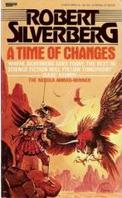
| Publisher: | Berkley |
| Copyright: | 1971 |
| Printing: | April 1979 |
| ISBN: | 0-425-04051-8 |
| Format: | Mass market |
| Pages: | 214 |
The world of Velada Borthan, long ago settled by a small religious sect, has a very strong and distancing morality: It is strictly taboo to confess one's inner feelings to another or make another to be witness to one's internal turmoil. The language has changed in the service of this morality, making "I" and "me" vile swear words to emphasize that one is to not bare oneself to others. There are only two exceptions: Each person has two bond-kin, one male and one female, and with them they may disclose anything. And anyone may pay one of the drainers, a sort of priest of the native gods who listens to anything one wishes to say as the ear of the gods and says and does nothing about it.
In this world, Silverberg writes a character study of a native named Kinnel, a prince of one of the countries who is exiled for political reasons after an accident, wanders his world, and encounters a travelling Earthman who convinces him to experiment with a drug that conveys telepathy. Kinnel comes to question the basis of his world and his religion, and in turn is betrayed by it, finally starting to spread the drug and the new way of thinking through his world.
A Time of Changes feels like a story from its decade. The medievalish setting on a distant planet has since dropped out of style and now seems dated and quaint. The extended descriptions of geography and politics, full of made-up names and details that are quickly lost without a map and barely relevant to the story, also come from that era and add little to the story. The rest, though, diverges from its pulp setting and avoids two-fisted action, or really much action at all. The plot is little more than a world exploration and a very simple story of the telepathy drug, there just to provide a setting for Kinnel's retrospective philosophical musings and descriptions of his thinking process. It's not badly written, and at times is lyrical and intriguing, but I still found it very slow.
Nothing about either the world or the plot is sufficiently inventive to hold the reader's attention apart from the core questions of human interaction and sharing. And there, I had a hard time seeing Silverberg's point beyond the surface level. Apart from some interesting but barely explored touches, such as links between bond-kin spreading through the world and making an informal network that cuts through politics, the isolation of the world's rules is more stated than clearly shown. The advantages of the drug are hazy at best, acting more like an addiction with philosophical cover than a true change of philosophy, which made the analysis less engrossing to me. I was convinced that the social structure was fragile and worth opening up and bringing down; I was unconvinced by Kinnel's initial belief in it, or that it showed much of interest about the nature of humanity. I kept thinking there were analogies or resonances I was missing, but if there were, I never managed to dig them out.
Silverberg does do a good job of portraying the internal conflict of someone who decides to challenge the social order and sense of propriety. Kimmel isn't a saint, and whether the drug is more mind-opening than taudry is left ambiguous. He shows some of the positives of the existing social order as well as the negatives, and makes the reader think about the disruption and chaos caused by such a huge change in the foundational principles of the world, even if the existing principles are wrong. He also shows how re-examination of one's culture leads directly to re-examination of oneself and vice versa. It was enough, barely, to carry my interest through the book, but the story would have been much better if it were linked to a strong plot.
A Time of Changes is notable for moving away from technological explorations and simple action and into much more difficult psychological and philosophical grounds, but the style didn't hold up well for me. It needed more layers, more things happening at the same time. As is, alas, I found it mostly boring.
Reviewed: 2006-07-04